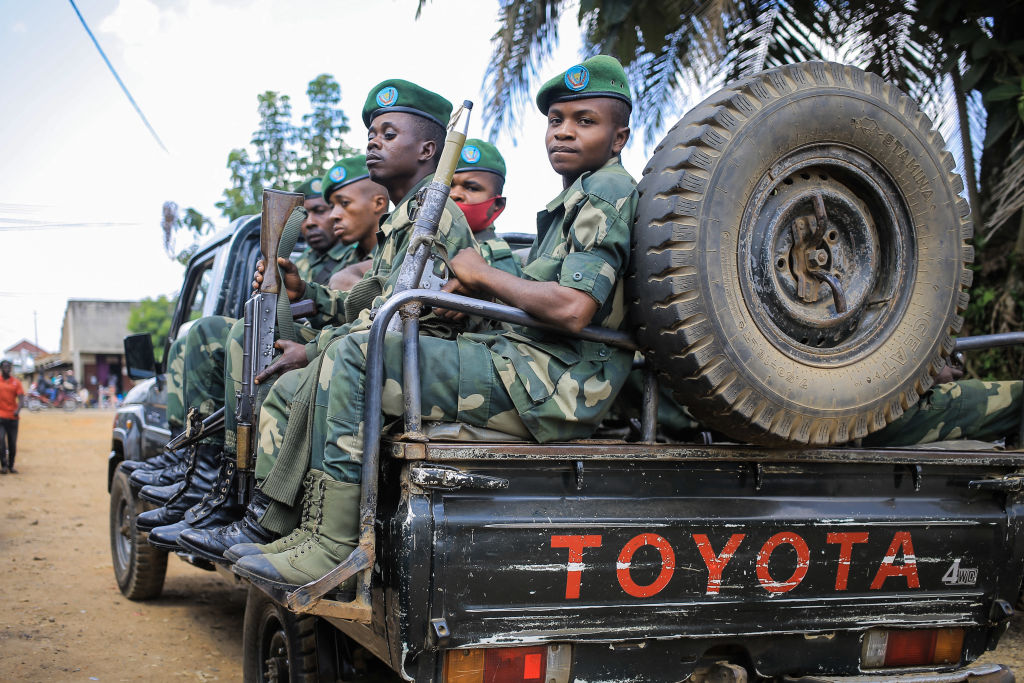
The DRC saw the highest global increase in military spending in 2023 – Sipri
With 49 percent of all military spending going to both China and the United States, they dominate the global military spending scene. The Stockholm International Peace Research Institute’s most recent estimate states that, in 2023, military spending worldwide increased to $2.4 trillion, a 6.8% rise from 2022.
Africa spends very little on the military. African nations spent $51.6 billion in 2023, or 2.1 percent of global expenditures. Nevertheless, this number represented a significant increase of 22% over the prior year.
The Democratic Republic of the Congo (DRC) and South Sudan are the two African nations with the largest annual growth rates worldwide.
The overall budget priorities of the government also show growth in spending. African nations’ average military spending as a percentage of total government spending climbed by 0.6 percentage points, from 6.6% in 2022 to 7.2 percent in 2023.
The DRC and South Sudan, two nations devastated by internal turmoil, as well as Algeria, which is seeing a surge in the export of fossil fuels, were the primary forces behind the enormous 2023 increase. When taken as a whole, their gains explained 87% of the increase in spending in Africa.
The DRC saw the largest global increase in military spending in 2023. It spent $794 million, which was 105% more than it did in 2022. The second-highest growth was in South Sudan. Military spending increased by 78 percent in 2023 to reach $1.1 billion, after rising by 108% in 2022.
My areas of interest in research are the origins, consequences, and relationships between military spending and civil unrest. As part of my current job, I evaluate the need for and effects of military spending as well as problems with budgeting and transparency for military-related concerns.
In my opinion, defense industry investments are essential to both internal stability and national security. They may also aid in the creation of jobs, which in turn promotes economic expansion and advancement. It has been discovered, meanwhile, that investing the same amount of money in the military produces fewer jobs than it does in industries like education or clean energy.
Furthermore, increased military spending may take funds away from vital socioeconomic sectors like infrastructure, healthcare, and education. This could make it more difficult to raise living conditions, fight poverty, and advance human development. This can then fuel a vicious cycle of unrest and insecurity inside a nation or area.
Taking Action in Conflict
The Democratic Republic of Congo’s military spending has increased in tandem with rising tensions with neighboring Rwanda and conflicts between the DRC armed forces and militia groups like the M23 over territory and natural resources.
For instance, the DRC purchased Chinese unmanned aerial vehicles in 2023 to counter the M23 in the nation’s east. The country’s intention to strengthen military capabilities in the wake of its request for the withdrawal of the UN’s Monusco DRC mission is also reflected in the spending.
The growth statistics for South Sudan are related to the security situation in neighboring Sudan as well as the rise of unrest in the Abyei region over land violations and oil rights.
Conflicts in 2023 between the paramilitary Rapid Support Forces and the Sudanese Armed Forces caused millions of refugees to escape to South Sudan and increased security threats in the region.
Unlike the Democratic Republic of the Congo, South Sudan’s increased spending was primarily allocated to human costs due to the UN arms embargo. It is extending its military reach close to the border with Sudan.
How much is security worth?
The DRC’s and South Sudan’s increased military spending in 2023 comes at a crucial moment. Although there is a trade-off with limited resources needed for important socioeconomic challenges, both countries must confront the rising level of insecurity.
Both South Sudan (192nd) and the Democratic Republic of the Congo (180th) are low on the UN’s Human Development Index, which ranks 193 nations. The index gives a general picture of a nation’s level of development by factoring in health and education results in addition to gross national income. Improving development outcomes requires investments in economic growth, health, and education given their low Human Development Index ranks. Spending on the military may take precedence over funding for human development with every additional dollar.
Furthermore, the Democratic Republic of Congo (DRC) became the African nation with the second-highest number of displaced persons in 2023, behind Sudan, with 7.1 million. At now, South Sudan is home to 4.6 million internally displaced individuals, which is the largest proportion of displaced persons among all African countries. Significant financial resources are required by both nations to support these displaced populations.
The military’s political power
Ensuring domestic stability and national security is a critical responsibility of the military. However, there are consequences to rising military spending patterns that should not be disregarded.
Governments that provide significant funding to the military may unintentionally lead to a rise in the military’s political clout in addition to the trade-off effects between military strength and socioeconomic development. As a result, there will be less civilian supervision and control, and there will be a higher chance of an illegal change in administration. Cases like Burkina Faso and Mali, with increasing levels of state persecution and human rights breaches, could be the result.
All Categories
Recent Posts
Tags
+13162306000
zoneyetu@yahoo.com



